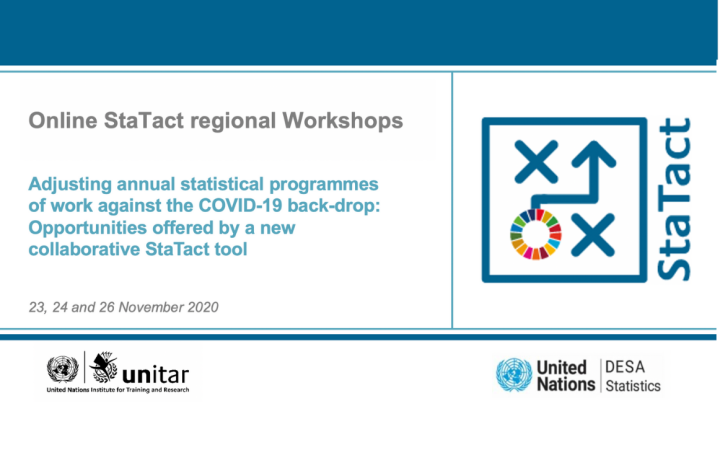In November 2020, UNITAR hosted – in collaboration with the UN Statistics Division - three regional online workshops for the Latin American, African and Asian regions to demonstrate the use of the updated, collaborative StaTact platform to respond to new challenges that have arisen as a result of the COVID-19 crisis and to make necessary adjustments to the annual statistical programmes of work. This was followed by the presentation of StaTact during the Webinar of the Global Network of Data Officers and Statisticians by UNITAR and UNSD on 8 December 2020.
As National Statistical Offices (NSOs) have been experiencing disruptions in some of the important statistical activities due to the COVID-19 situation, the importance of short-term approaches and quick problem-solving has grown in relevance. StaTact developed by UNITAR in close collaboration with the UN Statistics Division offers exactly such a tool rooted in a tactical approach to statistical planning. This tool provides a collaborative environment for members of National Statistical Systems (NSS) and users to meet online to easily set up their Working Groups with national and international stakeholders and discuss measurement issues at hand. By the end of the process, Working Groups are able to develop up-to-12-month action plans based on the root case analysis, as well as monitor their implementation and mark progress.
The relevance of StaTact, however, goes beyond the pandemic context. It is really about supporting operational, annual level programming and implementation. StaTact leverages two key models: GSBPM (Generic Statistical Business Process Model) and GAMSO (Generic Activity Model for Statistical Organizations) and can be a useful tool to overcome bottlenecks and build consensus of key stakeholders on possible solutions to addressing difficult data issues that, as one user pointed out, may have been discussed multiple times before, but are for the first time really addressed at their core.
StaTact was developed by UNITAR in collaboration with the UN Statistics Division with the support of a number of countries such as Switzerland, Sweden and Italy as a short-term data planning tool complementary to long-term planning tools such as ADAPT. Originally an Excel tool, last year saw the first web version of the tool and the latest version now provides enhanced features to enable ever greater collaboration. In the current context of social distancing in response to the pandemic, these features are really coming into their own.
During regional webinars, following the introduction to StaTact by Ms. Elena Proden, Senior Specialist with the Strategic Implementation of the 2030 Agenda Unit at UNITAR, Mr. Gabriel Gamez, Inter-regional Advisor at the UN Statistics Division, presented on the principles and underlying models of the StaTact platform – GAMSO and GSBPM - that help structure StaTact root cause analysis around governance and data process issues (supermarket scanner data to gather price and consumption data when hoarding). Demonstrations of the use of the StaTact platform involving administrative and new data sources and further explanations on StaTact methodology were made by data experts Mr. Geoffrey Greenwell and Mr. Trevor Fletcher, and a country case study has been developed by Paraguay in the Latin American region.
One of the key takeaways was the use of StaTact as both a consultative problem-solving but also a project management tool, with the functions to allow workflow management, communication between colleagues, and the implementation and monitoring of resolutions. Also highlighted was the functionality to generate reports and action plans that can be circulated to help statisticians advocate their cause or identify needed funding.
Questions from country participants focused on the importance of national indicators in addition to the SDG indicators, the use of alternative data sources and the linkages between StaTact and long-term planning tools. There was strong demand for further training. Participants were also keen to learn about the process to gain access to the tool, indicating a strong level of interest in the potential uses of StaTact.
The Global Network Webinar was an occasion to present StaTact to international experts and UN colleagues with questions related to the possible role of UN Country Team colleagues to support NSOs in StaTact use, and the possibility of using StaTact by international and regional organizations for global and regional data initiatives.
The webinars convincingly presented the new functionalities of StaTact to help address measurement issues and effectively manage project workflows, which have become all the more pressing issues in the Covid-19 context. The StaTact team are already expanding training on the platform, with a national workshop scheduled for the Philippines on 7-11 December 2020. In this national workshop, team members from the Philippine Statistics Authority are invited to work on problem statements they are currently facing in small working groups, with the aim to produce action plans as the outputs of the workshop.
For all questions regarding the StaTact tool, please contact a2030@unitar.org.


